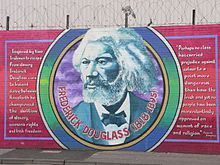Olga Núñez Miret's Blog: Author Translator Olga, page 104
February 27, 2014
Sir Walter Scott. Scotland, History, Legend and Everything in Between.
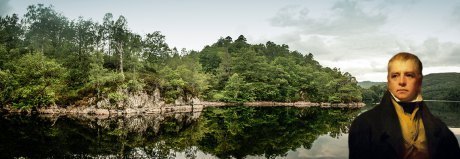
Trossachs. Sir Walter Scott based his ‘the Lady of the Lake’ on this area.
It is Friday and it’s guest author day. I seemed to have to write about Sir Walter Scott as he kept appearing everywhere. When I was writing last week’s post on Frederick Douglass, he chose his free-man name by adopting that of one of the characters in Sir Walter Scott’s ‘Lady of the Lake’. I was writing about Jorge Manrique, who was a Spanish knight and poet, and that made me think about knights, novels… and Sir Walter Scott. And today somebody mentioned Robbie Burns on the radio, and that made me think of Scotland and… So here he is.
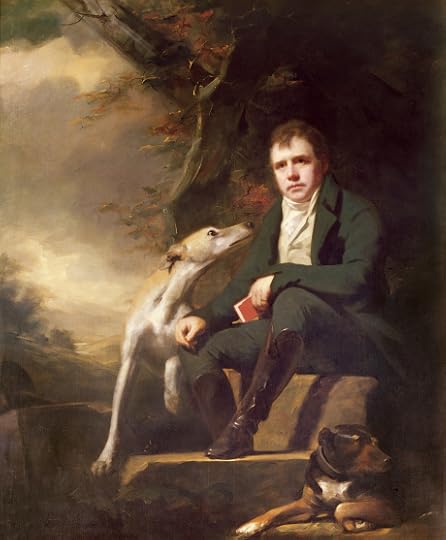
Henry Raeburn’s portrait of Sir Walter Scott and his dogs
Walter Scott (he was knighted by George the IV and became First Baronet) was born on the 15th of August 1771. His father was a successful solicitor and his grandfather (on his mother’s side, John Rutherford), had been Professor of Physiology at the University of Edinburgh. He contracted poliomyelitis when he was only a few months old and spent plenty of time at his grandparents’ farm in the Scottish Borders, (Tweeddale) where he showed an interest in history and the local customs.
He attended the Edinburgh High School and then with his father’s encouragement studied law at Edinburgh University (although according to one source he never took the degree exams as he only wanted to become an advocate, but passed the bar exam in 1792). Although he persevered with the legal job, he started writing poetry when he was 25 (he initially translated German poems and works). In 1797 he married Charlotte Carpenter, the daughter of a French refugee. They were happily married until her death (in 1826). They had four children. Their first born died when he was only one day old. In 1803 he published a three-volume set of collected Scottish ballads, The Minstrelsy of the Scottish Borders. This was followed by many narrative poems that became extremely popular, like The Lay of the Last Minstrel (1805), Marmion (1808), The Lady of the Lake (1810), Rokeby (1813) and The Lord of the Isles (1815). His depictions of the Scottish landscape, stories and customs helped to put Scotland on the radar and it became a touristic destination, fueling a fashion for all Scottish things.
He became Sheriff-Depute of Selkirk and a Principal Clerk to the Court of Session at Edinburgh. He continued to publish his own poems, reviewed, edited, set up a theatre in Edinburgh and helped fund the Quarterly Review in 1809.
Despite his great fame as poet (he declined the Poet Laureate in 1813 suggesting Robert Southey for the post) it would be his novels that would make him reach new heights in esteem and popularity. He published (anonymously) Waverley in 1814 (subtitled Sixty Years Since). This novel has been credited with creating the genre of the historical novel. Other novels dealing also with the Highlands and Jacobitism and forming part of what has become known as ‘the Waverley novels’ are Rob Roy (1817), The Heart of Midlothian (1818) and Redgauntlet (1824).

Sir Walter Scott’s home ‘Abbotsford’
He associated with Ballantyne’s in his publishing company, and was badly affected by the bank crisis of 1825 (yes, this is not a new thing). He also had difficulties due to the financing of the built of his home at Abottsford. I have read variously that the debt amounted to between £114000 to £140000 (a fortune at the time). Rather than declare himself bankrupt, he placed his home and income into a trust belonging to his creditors and carried on writing his way out of his debts. He suffered a series of strokes and died on 21st September 1832. It seems that he had not fully paid his debt at the time but with the royalties from his books this was settled shortly after his death. He was buried at Dryburgh Abbey with his ancestors.
Some of his other novels include: Ivanhoe (set in England, 1819, probably the best known of them all), The Bride of Lammermmoor (also in 1819), Kenilworth (1821), The Fortunes Of Nigel (1822), Peveril Of The Peak (1823), Quentin Durward (1823), The Talisman (1825), Woodstock (1826), The Surgeon’s Daughter (1827), and Anne Of Geierstein (1829).
Sir Walter Scott was also one of the first authors to become internationally renowned and admired in other countries, and he toured often.
He was not only prolific, hard-working and principled, but very modest. I loved this comment that I felt I had to share:
While on holiday in Shetland he wrote:
…it would be a fine situation to compose an ode to the Genius of Sumburgh-head,
or an Elegy upon a Cormorant – or to have written or spoken madness of any kind
in prose or poetry. But I gave vent to my excited feelings in a more simple way;
and sitting gentle down on the steep green slope which led to the beach, I e’en
slid down a few hundred feet, and found the exercise quite an adequate vent to
my enthusiasm, I recommend this exercise (time and place suiting) to all my brother
scribblers, and I have no doubt it will save much effusion of Christian ink.
(I must thank Stuart Kelly at the Scottish Poetry Library for sharing it in his page. Link below)
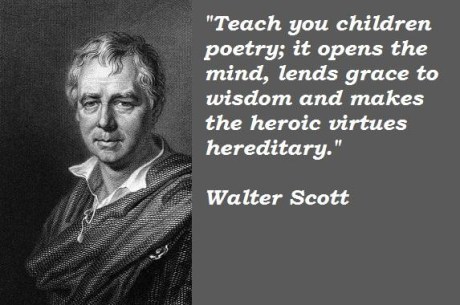
Sir Walter Scott on poetry
Links:
Biography:
Wikipedia:
http://en.wikipedia.org/wiki/Walter_Scott
His digital archive at the University of Edinburgh.
http://www.walterscott.lib.ed.ac.uk/
BBC2. Writing Scotland:
http://www.bbc.co.uk/programmes/p00mr8yj/profiles/walter-scott
Website for Abbotsford, his home:
http://www.scottsabbotsford.com/
Encyclopaedia Britannica:
http://www.britannica.com/EBchecked/topic/529629/Sir-Walter-Scott-1st-Baronet
His page at the Scottish Poetry Library:
http://www.scottishpoetrylibrary.org.uk/poetry/poets/sir-walter-scott
SpartacusSchool net:
http://www.spartacus.schoolnet.co.uk/Jscott.htm
The Literature network:
http://www.online-literature.com/walter_scott/
Works:
His books in Amazon.co.uk (there a few free versions and many cheap ones):
http://www.amazon.co.uk/Sir-Walter-Scott/e/B001H6EPEI
And in Amazon.com:
http://www.amazon.com/Sir-Walter-Scott/e/B001H6EPEI
This is his author page at the Project Gutenberg where you can find and download free e-books:
http://www.gutenberg.org/ebooks/author/59
Some of the above links, like his digital archive, contain also online links to his works.
Images:
The header is from:
http://infinite-scotland.com/poi/sir-walter-scott/
And the quote above came from:
http://bhuwanchand.wordpress.com/2013/09/17/dailybookquote-17sep13-sir-walter-scotts-ivanhoe/
For more pictures and information about his home:
http://exploretheborders.com/sir-walter-scott-and-abbotsford/
And I leave you also an article quoting Stuart Kelly talking about Sir Walter Scott’s importance:
http://www.theguardian.com/books/2010/aug/16/walter-scott-edinburgh-book-festival
Thanks for reading, I hope you’ve enjoyed it and if you have, please remember to like, share, comment and CLIC! Never stop reading!








February 24, 2014
Un cambio está al caer

Image courtesy of Stuart Miles / FreeDigitalPhotos.net
Hola a todos:
He comentado varias veces que estoy planeando algunos cambios. Dejo mi trabajo a finales de Marzo. Sí, ya sé que no es la mejor época para dejar el trabajo, pero…
“Solo hay una forma de evitar las críticas: no hacer nada, no decir nada y no ser nada.”(Aristóteles)
¿Por qué lo dejo? Hay varias razones, pero encontré esta cita de Steve Jobs que da en el clavo:
“Durante los últimos 33 años, me he mirado al espejo cada mañana y me he preguntado: ‘Si hoy fuera el último día de mi vida, ¿querría hacer lo que estoy a punto de hacer hoy?’ Y cuando la respuesta ha sido ‘No’ demasiados días seguidos, sé que tengo que cambiar algo.” (Steve Jobs)
He cambiado bastantes cosas en mi vida en los últimos años. Me mudé a Inglaterra hace muchos años, estudié psiquiatría y trabajé de psiquiatra, decidí dejarlo y estudié la carrera de Filología Americana (Licenciatura y luego Doctorado) y volvía a la psiquiatría (hace ahora 11 años). Empecé a auto-publicar mis libros hace casi un año y medio (llevo escribiendo desde que era muy joven, pero nunca era el momento adecuado para publicar. Ya sabéis como son las cosas). Disfruté mucho estudiando Filología y Literatura Americana. Siempre me ha encantado leer y los libros, y fue una etapa fabulosa de mi vida, aunque tuve que dedicarme a hacer suplencias durante las vacaciones, pero valió la pena. También me han gustado mucho algunos de mis trabajos (o para ser más precisos algunas temporadas en algunos de mis trabajos). Pero desde que empecé a dedicarme a la escritura más en serio, el desfase entre lo que de verdad me gustaría hacer y lo que hago cada día se me ha hecho mucho más evidente.
Así que, como dice Mark Twain:
“Dentro de veinte años estarás más desilusionado por las cosas que no hiciste que por las que hiciste, así que iza el ancla, aléjate del puerto seguro, atrapa los vientos propicios con tus velas. Explora, Sueña, Descubre.” (Mark Twain)
Hasta ahora había intentado ‘nadar y guardar la ropa’, tenerlo todo, la seguridad y la aventura y el hacer lo que de verdad amo. No funciona. Quizás hay cosas más importantes.
“ ¿Qué es el dinero? Un hombre tiene éxito si se levanta por la mañana y se acuesta por la noche y durante ese tiempo hace lo que quiere hacer.” (Bob Dylan)
Espero que eso también sea aplicable a una mujer. (Y no os preocupéis. No tengo nadie que dependa de mis y solo tengo que mantenerme a mí misma.)
Después de todo, las definiciones del éxito son personales:
‘El éxito es caerse nueve veces y levantarse diez.” (Jon Bon Jovi)
Y:
“Ha conseguido el éxito el que ha trabajado bien, se ha reído a menudo, y ha amado mucho.” (Elbert Hubbard)
Creo que tengo que reírme más. A ver si lo consigo.
“Nunca puedes cruzar el océano hasta que tengas el valor suficiente para perder de vista la orilla.” (Cristóbal Colón)
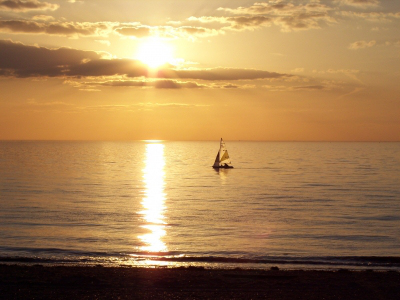
Image courtesy of Dominic Harness / FreeDigitalPhotos.net
¡Espero que me acompañéis!
Gracias por leer, y si os apetece darle al me gusta, compartir, o comentar, no intentaré impedíroslo.
Algunas de las citas las he coleccionado a ratos pero la mayoría vienen de Brainyquote.com (en inglés. Las traducciones son mías, así que si no encontráis la cita exacta no os extrañéis). Os dejo el enlace por si queréis un poco de inspiración.
http://www.brainyquote.com/quotes/topics/topic_future.html








A Change is (soon) Coming
Hi all:
I have mentioned a few times that I am planning some changes. I am leaving my job by the end of March. Yes, I know it’s not the best time to leave a job. But…
“There is only one way to avoid criticism: do nothing, say nothing, and be nothing”. (Aristotle)
Why am I leaving? There are a variety of reasons, but I’ve found this reflection by Steve Jobs that gets to the heart of it:
“For the past 33 years, I have looked in the mirror every morning and asked myself: ‘If today were the last day of my life, would I want to do what I am about to do today?’ And whenever the answer has been ‘No’ for too many days in a row, I know I need to change something.” (Steve Jobs)
I’ve made some changes to my life in recent years. I moved to the UK now many years back, I studied psychiatry and worked in it, I decided to leave it and studied American Literature (BA and PhD) and came back to psychiatry for a few years. More recently I’ve started publishing my books (I’ve been writing for many years but it was never the right moment. You know how it is). I loved studying Literature. I’ve always loved books and reading, and it was a fantastic period of my life, even though I had to do locums and work during my holidays. I have loved some jobs, or to be more specific, some periods at some of my jobs. But since taking up writing more seriously, the gap between what I’d really love to do and what I do everyday has become more evident.
And so, as Mark Twain says:
“Twenty years from now you will be more disappointed by the things that you didn’t do than by the ones you did do, so throw off the bowlines, sail away from safe harbor, catch the trade winds in your sails. Explore, Dream, Discover.” (Mark Twain)

Image courtesy of Dominic Harness / FreeDigitalPhotos.net
I’ve tried to do what in Spain we call ‘to swim and keep an eye on your clothes’, to have it all: security and adventure and do what I love. It doesn’t work. Maybe there are more important things.
“What’s money? A man is a success if he gets up in the morning and goes to bed at night and in between does what he wants to do.” (Bob Dylan)
I hope that applies to a woman too. (Don’t worry. I only need to look after myself and have no dependants.)
After all, the definition of success is personal:
“Success is falling nine times and getting up ten.” (Jon Bon Jovi)
And:
“He has achieved success who has worked well, laughed often, and loved much.”(Elbert Hubbard)
I think I need to laugh more. See if I manage.
“You can never cross the ocean until you have the courage to lose sight of the shore.” (Christopher Columbus)
I hope you come with me!
Thanks for reading and if you fancy liking, sharing or commenting, don’t let me stop you!

Image courtesy of Stuart Miles / FreeDigitalPhotos.net
Some quotes I’ve collected over time but most of them come from Brainyquote.com. I leave you a link for your inspiration.
Links:
http://www.brainyquote.com/quotes/topics/topic_future.html








February 20, 2014
Colaboradores con mucho talento. Alexia Jorques, editora, diseñadora de portadas y mucho más

Banner de Alexia Jorques
Hola a todos! Como sabéis los viernes normalmente os traigo un autor o autora como invitados, pero he estado pensando en los colaboradores que ayudan a los autores a que sus libros sean un producto pulido, sin errores, y bello, y sin ellos nuestros libros no serían lo que son. Así que decidí intentar traeros a alguna de la gente maravillosa con la que trabajamos. Hoy os traigo a Alexia Jorques, que se encargó de corregir ‘Una vez psiquiatra…’ y también se dedica a crear portadas para libros. Fue muy amable y contestó a unas preguntas que hace tiempo me intrigaban. Os dejo una mini-entrevista, y enlaces a sus páginas donde podéis encontrar ejemplos de su trabajo y más información. Os la recomiendo encarecidamente.
Aquí está la entrevista:
Hola Alexia. Gracias por visitar mi blog y por contarnos algunas cosas sobre tí.
¿Cómo empezaste a dedicarte a esto? ¿Te lo planteaste como un negocio desde el principio o ocurrió como algo orgánico?
Empecé hará más de un año, aprendí de modo autodidacta para poder editar y maquetar mis libros preferidos a formato digital y poder leerlos en mi reader. Esos libros no estaban disponibles en ebook y me hacía ilusión tenerlos editados por mí.
Respecto al diseño de portadas, la verdad es que siempre me ha encantado diseñar cosas, ya sean wallpapers, firmas para foros, banners para blogs, etc.
Más adelante decidí ofrecer mis conocimientos y experiencia para poder ayudar en estas labores a escritores noveles/independientes.
¿Cómo te inspiras para crear portadas?
Principalmente me dejo guiar por los deseos del autor, que me explique como se imagina su portada ideal, que me hable un poco sobre ella, y a partir de ahí vemos si es viable su idea o si puedo ofrecerle una alternativa mejor. Luego buscamos las imágenes que mejor se adapten y una vez se decide me pongo manos a la obra. Vamos cambiando, retocando y demás, hasta que el autor tiene la portada que más le gusta.
¿Qué es lo que más te gusta de lo que haces?
Ambas cosas me gustan, pero el diseño es mi pasión, no puedo evitarlo, disfruto muchísimo realizando las portadas y me emociona ver alguno de mis diseños en los más vendidos en Amazon, y últimamente me están dando muchas alegrías, ya me muchos de ellos están alcanzando el Top 1 en sus respectivas categorías, esto hace que cada día me esfuerce más.
Me hace especial ilusión diseñar portadas para todos los géneros, no me gusta encasillarme, cada nuevo género es un reto para mí, y en esto del diseño adoro los retos, me hacen crecer y me demuestro a mí misma que puedo.
Mis enlaces:
http://alexiajorques.wordpress.com
https://www.facebook.com/pages/AJ-Ediciones-Digitales/210243752442398
https://twitter.com/AJEdiciones
Gracias por leer, y si os ha gustado y estáis interesados, no os olvidéis de comentar, compartir, y hacer CLIC!

Logo de Alexia Jorques Ediciones Digitales








Today’s Guest: Frederick Douglass. Ex-slave, self-made man, leader and fighter
Hi all:
You know on Fridays I usually bring you a guest author. Recently I went to watch ’12 Years a Slave’, like many people. The film reminded me of my studies in American Literature, slave narratives, autobiographies, and in the list of people that came to my mind, I kept thinking about Frederick Douglass. I read his autobiography years back, and is it one of these books that make you realise that human will is a force like no other and gives you hope for the human race. And I thought I might as well share why I think he was such an example and a man we should never forget.
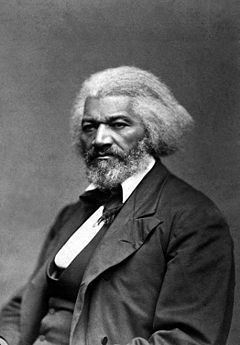
Frederick Douglass portrait
I’ll leave you a short biography, some quotes, links, and I recommend you read his autobiography. It is not only inspiring but a great read.
Biography:
He was born into slavery, Frederick Washington Bailey, in Tukahoe, Maryland (7th February 1817 although the specific date is in question). He was the son of a slave woman (he only saw his mother a few times before she died when he was 7) and was brought up by his grandparents on a plantation. His father was white and he never knew him (it is suspected it could have been the slave owner).
When he was 8 he was sent to Hugh Auld in Baltimore. The wife of Auld taught him the alphabet (defying state law that slaves should not be taught to read) and he continued to learn from other kids. He returned to the plantation in 1833 and was sold to a slave owner renowned for his cruelty, until he confronted him when he was older. Whilst working in a shipyard at age 20 he managed to escape and went to New York City, where he changed his name to Frederick Douglass (name of the hero in Sir Walter Scott’s The Lady of the Lake). He moved to New Bedford, Massachusetts, where he worked as a labourer. He married for the first time Anna Murray, a free black woman, and had 5 children.
Always acknowledged as a leader by his peers, William Lloyd Garrison heard him speak at a meeting in 1841 and became his mentor. Douglass became an agent and lecturer for the American Anti-Slavery Society. He was very successful and with the help of the Agency he published the first of his autobiographical works The Narrative of the Life of Frederick Douglass, An American Slave (1844).
Worried about the possibility of being recaptured by his former owner, he traveled to Britain and Ireland and lectured on slavery. While he was there he raised funds and established his own anti-slavery paper The North Star. This created a rift with William Lloyd Garrison who opposed such idea and this continued throughout the Civil War, despite efforts by Harriett Beecher Stowe. In 1855 he published My Bondage and My Freedom.
During the Civil War, Douglass tried to convince Abraham Lincoln that former slaves should be allowed to join the Union Army. After the war he continued his campaigns for full civil rights for former slaves, also advocating women’s suffrage and speaking on the Irish rule.
When his first wife died, he married his secretary, Helen Pitts, a white woman, causing controversy.
He held several public posts (and was proposed as vice-president in a joint-bill with a woman) including assistant secretary of the Santo Domingo Commission (1871), marshall of the District of Columbia (1877-1881) and U S Minister to Tahiti (1889-1891). In 1881 he published The Life and Times of Frederick Douglass.
He died of heart failure in Washington on the 20th February, 1895. He has had bridges named after him, schools, stamps…
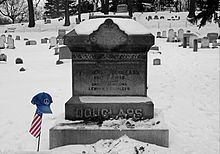
Frederick Douglass’s gravestone
Quotes:
The masthead of his newspaper The North Star once read:
Right is of no Sex – Truth is of no Color.
I will unite with any one to do right, and with no one to do wrong!
I prayed for twenty years but received no answer until I prayed with my legs.
People might not get all they work for in this world, but they must certainly work for all they get.
No man can put a chain about the ankle of his fellow man without at last finding the other end fastened about his own neck.
A little learning, indeed, may be a dangerous thing, but the want of learning is a calamity to any people.
The soul that is within me no man can degrade.
To suppress free speech is a double wrong. It violates the rights of the hearer as well as those of the speaker.
America is false to the past, false to the present, and solemnly binds herself to be false to the future.
It is not light that we need, but fire; it is not the gentle shower, but thunder. We need the storm, the whirlwind, and the earthquake.
Without a struggle, there can be no progress.
Power concedes nothing without a demand. It never did and it never will.
Find out just what any people will quietly submit to and you have the exact measure of the injustice and wrong which will be imposed on them.
I prefer to be true to myself, even at the hazard of incurring the ridicule of others, rather than to be false, and to incur my own abhorrence.
Link to quotes page (Brainy Quotes):
http://www.brainyquote.com/quotes/authors/f/frederick_douglass.html
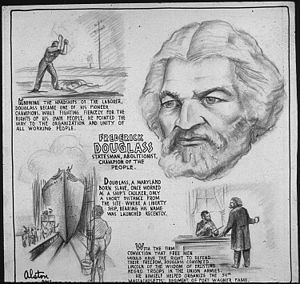
Brief visual summary of achievements
Wikipedia:
http://en.wikipedia.org/wiki/Frederick_Douglass
Biography.com (Includes a brief video of his biography):
http://www.biography.com/people/frederick-douglass-9278324
PBS:
http://www.pbs.org/wgbh/aia/part4/4p1539.html
His papers at the Library of Congress:
http://www.loc.gov/collection/frederick-douglass-papers/about-this-collection/
Spartacus school:
http://www.spartacus.schoolnet.co.uk/USASdouglass.htm
History.com (also brief video about Douglass):
http://www.history.com/topics/black-history/frederick-douglass
Documenting the American South:
http://docsouth.unc.edu/neh/douglass/bio.html
Digital History:
http://www.digitalhistory.uh.edu/exhibits/douglass_exhibit/douglass.html
His page in Goodreads;
https://www.goodreads.com/author/show/18943.Frederick_Douglass
Links to works (FREE):
In Amazon:
Narrative of the Life of Frederick Douglass
http://www.amazon.com/dp/B0083ZQSEG/
Collected Articles of Frederick Douglass
http://www.amazon.com/dp/B000JQV6NA/
His page in Project Gutenberg, including audios:
http://www.gutenberg.org/ebooks/author/34510
Link to his autobiography in American History:
http://www.let.rug.nl/usa/biographies/frederick-douglass/
Thanks for reading, and if you’ve enjoyed it, don’t forget to like, comment, share, and CLIC!
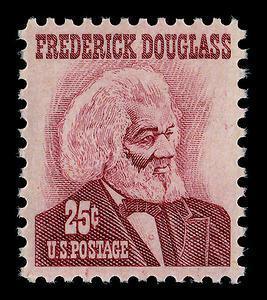
25 c. postage stamp








February 17, 2014
Mi entrevista con Freddy Piedrahíta. A escuchar se ha dicho!

Podcast de Ondas de la Bahía
Hola a todos:
Os he hablado en muchas ocasiones de varios grupos de autores a los que pertenezco, y también os he comentado sobre algunas de las inicitativas que organizan (antologías, entrevistas itinerantes, blog tours…). Una de las mejores cosas de estos grupos,es que somos gente diversa, con variadas experiencias personales, y conocemos a gente que se dedica a todo, médicos, correctores, artistas, aventureros, deportistas…
Una de las autoras de nuestro grupo y muy admirada por todos, Blanca Miosi, nos presentó a Freddy Piedrahíta, un as de la radio que estaba muy interesado en promocionar la lectura, y fascinado por el movimiento de los escritores indies. Freddy muy generosamente nos ofreció espacio en su programa, y se propuso ir entrevistando a los autores del grupo. Después de un hiato de unos meses, el programa a vuelto al aire, y me tocó el turno a mí.
Así que por si os interesa escucharme (la verdad es que yo casi no me reconozco a mí misma, pero en fin), os dejo un enlace al podcast de la entrevista. Ya os daréis cuenta de que me enrollo como una persiana, y como le he comentado a más de una persona, desde luego a la radio como profesión no me voy a dedicar.
https://www.spreaker.com/user/emotionalhealth1/ondas-de-la-bahia-14
Por cierto, si os gusta (incluso si no os gusta, que ya os digo que yo no tengo mucha gracia para eso), no os perdáis las entrevistas de los demás compañeros, que de todo hay. Y el resto del programa tampoco tiene desperdicio.
Aquí os dejo la página de Facebook de Freddy donde anuncia su programa:
https://www.facebook.com/freddy.piedrahita.3?fref=ts
Y la del Rincón Literario, para que obtengáis más información:
https://www.facebook.com/pages/El-Rinc%C3%B3n-Literario/761131157250097?notif_t=fbpage_fan_invite
Gracias por leer y escuchar, y ya sabéis, si lo habéis encontrado interesante, dadle al me gusta, compartid, comentad, y haced CLIC!

imagen de emisora de radio








Review of ‘Hungry Ghosts’ by John Dolan.
Today I bring you another review. A few months ago I had the pleasure of reading and reviewing the first book in the ‘Time, Karma and Blood Series’ by John Dolan, ‘Everyone Burns’. And I could not pass the opportunity to read and comment the second one. I leave you my five stars review, a link to the book in e-format and paperback and a link to my review of the previous book, just in case you missed it.

Hungry Ghosts, ‘Time, Blood and Karma’ Book 2 by John Dolan
Hungry Ghosts (Time, Karma and Blood Series Book 2) by John Dolan. Family secrets, family feuds, betrayals and ghosts.
‘The spirits of the dead are all around us, but it is we, the living, that are the true hungry ghosts.’ I could not agree more with the reflections of David Braddock, the detective-cum-philosopher and therapist who is the protagonist of Hungry Ghosts, the second book in the ‘Time, Karma and Blood Series’ by John Dolan. I read the first book in the series Everyone Burns and when I reviewed it I mentioned that I thought this would be a five star series but the first book left me wanting more and with too many questions pending. Be reassured, Hungry Ghosts delivers on all the promises of the first and more, and although, of course this being a series everything could not be resolved, the novel answers many of the questions, whilst opening new avenues for inquiry and intriguing plots.
‘Sometimes I come across as superficial. Of this I am aware. However, you may be confident that inside my head I am forever plumbing new shallows, finding novel ways to express the obvious, reheating old jokes.’
David Braddock, one of the most peculiar detectives I’ve met in fiction (and I am aware all famous detectives have quirks and characteristics that make them memorable) is back with a vengeance. Or rather, he is the intended victim of a revenge attempt. Vending the rules, although it appears to be the standard MO in Thailand, does not come without consequences even there. People die, lives are destroyed, and strange alliances are made and broken. Not your standard day at the office.
If Braddock still retains many of the characteristics we’ve come to expect of most males detectives (he has an array of love interests, two of them married, one related to him by first marriage…), we get to see more of his soft/emotional side. His strange relationship with his first wife (now dead), his daughter (away in England), his housekeeper (not his maid, as he insists throughout the whole book. She is clearly much more than a housekeeper, as signaled by the fact that they have never had sex), his mother-in-law, and crucially, his father. Family secrets abound, not only those of the Braddock family, but also of other families. Fathers and sons with troubled relationships are mirrored on both sides of the law (although the lines are very fine and there is no black and white here, rather different shades of grey), and even Braddock’s Zen master, the Old Monk, has sons who are on opposite sides of the law.
The author shows his talent by using a variety of points of view throughout the novel that allow us to understand better the events and the motivations behind the actions of the characters. We share in the murderer’s frame of mind, the Chief of Police of Samui and his wife (and Braddock’s lover), the detective’s sister in law, the gangsters… We might side with Braddock but we are privy to the thoughts and feelings of others and are a step ahead. That is why the twist at the end is even more effective. We should have seen it coming but we were too taken by the action and the story, and rooting for the flawed hero to realise that…
John Dolan treads carefully and manages to recap enough information to allow somebody who has not read the first novel to enjoy and make sense of this one, whilst at the same time not boring somebody who has recently read ‘Everyone Burns’, and just nudging their memory (especially with the unfamiliar names) along.
David Braddock is fast becoming one of my favourite detectives. Although an amateur at both detective work and psychology (or therapeutic interventions), he has a natural flair for both. I couldn’t help but think that he might make an interesting team with Mary, the psychiatrist who gets involved in all sorts of crimes in my stories. It’s a thought.
Hungry Ghosts has gang-warfare, police corruption, revenge, murders and violence, secrets and revelations, honey traps and meddling employees, witty repartees and reflections (‘I need to simplify my life so far as women are concerned. Maybe I should get castrated and have done with it.’), ghosts and padrinos (Thai style). I, for one, can’t wait to see what happens next and what will come of the sudden epiphany Braddock experiences in this book. As he observes: ‘We are the artisans of avoidance, the fabricators of falsehoods. We sell ourselves snake-oil and we call it medicine.’ I’m sure there will be more revelations to come and I suspect the author might take us in unsuspected directions. I am getting a ticket for the next trip. Are you?
Links:
e-version:
http://www.amazon.com/dp/B00ENZAURQ/
Paperback:
http://www.amazon.com/dp/0957325622/
Here I leave you a link to my previous post about ‘Everyone Burns’.
Thanks for reading, and you know the drill, if you’ve enjoyed it, like, share, comment, and don’t forget to CLICK!








February 14, 2014
Chronicles of an Indie Book Publicist: 5
Chronicles of an Indie Book Publicist: 5 Things Self-Published Authors Need to Stop Immediate… via @seumasgallacher http://ow.ly/tE124








February 13, 2014
Celebremos San Valentín con poemas de amor!
Como bien sabéis los viernes os traigo autores invitados, pero como este viernes coincidió que es San Valentín, me apeteció hacer algo diferente. Así, sin orden ni concierto, busqué algunos de mis poemas románticos favoritos y que me llamaron la atención, y aquí os los traigo. En inglés, español y catalán, para que haya un poco de todo. Shakespeare tocaba porque hace tiempo que ando pensando que lo tengo que traer de invitado, pero da para tanto que no me decido. E. E. Cummings (o e.e. cummings, ya que su ortografía es tan especial como su obra) siempre me hace sonreír. Estaba pensando en uno de los poemas de Luís Cernuda y buscando encontré el cortido que me gustó mucho. El de Vicent Andrés Estellés me gusta por lo directo, y la canción de Serrat… me pone la piel de gallina. Añadí un video de él muy jovencito cantándola en 1968 para que no falte nada. Y un juego tonto por aquello de pasar el rato.
William Shakespeare
Sonnet XVIII
Shall I compare thee to a summer’s day?
Thou art more lovely and more temperate:
Rough winds do shake the darling buds of May,
And summer’s lease hath all too short a date:
Sometime too hot the eye of heaven shines,
And often is his gold complexion dimmed,
And every fair from fair sometime declines,
By chance, or nature’s changing course untrimmed:
But thy eternal summer shall not fade,
Nor lose possession of that fair thou ow’st,
Nor shall death brag thou wander’st in his shade,
When in eternal lines to time thou grow’st,
So long as men can breathe, or eyes can see,
So long lives this, and this gives life to thee.
Sonnet CXVI
Let me not to the marriage of true minds
Admit impediments. Love is not love
Which alters when it alteration finds,
Or bends with the remover to remove:
O, no! it is an ever-fixed mark,
That looks on tempests and is never shaken;
It is the star to every wandering bark,
Whose worth’s unknown, although his height be taken.
Love’s not Time’s fool, though rosy lips and cheeks
Within his bending sickle’s compass come;
Love alters not with his brief hours and weeks,
But bears it out even to the edge of doom.
If this be error and upon me proved,
I never writ, nor no man ever loved.
Sonnet CXXX
My mistress’ eyes are nothing like the sun;
Coral is far more red, than her lips red:
If snow be white, why then her breasts are dun;
If hairs be wires, black wires grow on her head.
I have seen roses damasked, red and white,
But no such roses see I in her cheeks;
And in some perfumes is there more delight
Than in the breath that from my mistress reeks.
I love to hear her speak, yet well I know
That music hath a far more pleasing sound:
I grant I never saw a goddess go,
My mistress, when she walks, treads on the ground:
And yet by heaven, I think my love as rare,
As any she belied with false compare.
E.E. Cummings (or e e cummings)
i carry your heart with me
i carry your heart with me(i carry it in
my heart)i am never without it(anywhere
i go you go,my dear; and whatever is done
by only me is your doing,my darling)
i fear
no fate(for you are my fate,my sweet)i want
no world(for beautiful you are my world,my true)
and it’s you are whatever a moon has always meant
and whatever a sun will always sing is you
here is the deepest secret nobody knows
(here is the root of the root and the bud of the bud
and the sky of the sky of a tree called life;which grows
higher than the soul can hope or mind can hide)
and this is the wonder that’s keeping the stars apart
i carry your heart(i carry it in my heart)
Luís Cernuda
No decía palabras
No decía palabras,
acercaba tan sólo un cuerpo interrogante,
porque ignoraba que el deseo es una pregunta
cuya respuesta no existe,
una hoja cuya rama no existe,
un mundo cuyo cielo no existe.
La angustia se abre paso entre los huesos,
remonta por las venas
hasta abrirse en la piel,
surtidores de sueño
hechos carne en interrogación vuelta a las nubes.
Un roce al paso,
una mirada fugaz entre las sombras,
bastan para que el cuerpo se abra en dos,
ávido de recibir en sí mismo
otro cuerpo que sueñe;
mitad y mitad, sueño y sueño, carne y carne,
iguales en figura, iguales en amor, iguales en deseo.
Auque sólo sea una esperanza
porque el deseo es pregunta cuya respuesta nadie sabe.
Lee todo en: No decía palabras – Poemas de Luis Cernuda http://www.poemas-del-alma.com/no-decia-palabras.htm#ixzz2sH7iPEmp
Contigo
¿Mi tierra?
Mi tierra eres tú.
¿Mi gente?
Mi gente eres tú.
El destierro y la muerte
para mi están adonde
no estés tú.
¿Y mi vida?
Dime, mi vida,
¿qué es, si no eres tú?
Lee todo en: Contigo – Poemas de Luis Cernuda http://www.poemas-del-alma.com/contigo.htm#ixzz2sH7wO9WQ
Vicent Andrés Estellés:
Els amants
No hi havia a València dos amants com nosaltres.
Feroçment ens amàvem del matí a la nit.
Tot ho recorde mentre vas estenent la roba.
Han passat anys, molt anys; han passat moltes coses.
De sobte encara em pren aquell vent o l’amor
i rodolem per terra entre abraços i besos.
No comprenem l’amor com un costum amable,
com un costum pacífic de compliment i teles
(i que ens perdone el cast senyor López-Picó).
Es desperta, de sobte, com un vell huracà,
i ens tomba en terra els dos, ens ajunta, ens empeny.
Jo desitjava, a voltes, un amor educat
i en marxa el tocadiscos, negligentment besant-te,
ara un muscle i després el peço d’una orella.
El nostre amor és un amor brusc i salvatge
i tenim l’enyorança amarga de la terra,
d’anar a rebolcons entre besos i arraps.
Què voleu que hi faça! Elemental, ja ho sé.
Ignorem el Petrarca i ignorem moltes coses.
Les Estances de Riba i les Rimas de Bécquer.
Després, tombats en terra de qualsevol manera,
comprenem que som bàrbars, i que això no deu ser,
que no estem en l’edat, i tot això i allò.
No hi havia a València dos amants com nosaltres,
car d’amants com nosaltres en són parits ben pocs.
Joan Manuel Serrat
Paraules d’amor
Paraules d’amor (Serrat)
Ella em va estimar tant…
Jo me l’estimo encara.
Plegats vam travessar
una porta tancada.
Ella, com us ho podré dir,
era tot el meu món llavors
quan en la llar cremàvem
només paraules d’amor…
Paraules d’amor senzilles i tendres.
No en sabíem més, teníem quinze anys.
No havíem tingut massa temps per aprendre’n,
tot just despertàvem del son dels infants.
En teníem prou amb tres frases fetes
que havíem après d’antics comediants.
D’històries d’amor, somnis de poetes,
no en sabíem més, teníem quinze anys…
Ella qui sap on és,
ella qui sap on para.
La vaig perdre i mai més
he tornat a trobar-la.
Però sovint en fer-se fosc,
de lluny m’arriba una cançó.
Velles notes, vells acords,
velles paraules d’amor…
Aquí el video (molt jovenet):
https://www.youtube.com/watch?v=h6da-yrtBIY
Y el juego es el Love Calculator. Escribís los nombres de los dos enamorados y os da un porcentaje de compatibilidad. Parece realmente científico y riguroso… (:))
Love calculator:
http://www.glamourmagazine.co.uk/features/love-calculator
Gracias por leer, y ya sabéis, si os ha gustado, dadle al me gusta, comentad, compartid, y sobre todo, quereos mucho!








Let’s Celebrate Valentine’s Day with a bit of poetry.
As you know normally I bring you a guest on Fridays. As today is Valentine’s day, I fancied doing something different. I randomly chose some poems I like (I’ve shared some of my other favourite ones when posting about their authors and there are more to come) that I thought were suitable for the day. I decided to post them in English, Spanish and Catalan. You can pick and choose. I could not help but post Shakespeare (I’ve been feeling quite bad for not bringing him as a guest yet, but there is so much I haven’t decided how to do it yet), and e.e. cummings (or E. E. Cummings, he had his own punctuation style) always makes me smile. Regarding Luis Cernuda, I was thinking of a particular poem and looking for it could not help but add another one. The Catalan ones I just like the directness of Vicent Andrés Estellés and love the song by Serrat (that now I can’t stop singing).
And here they are:
William Shakespeare
Sonnet XVIII
Shall I compare thee to a summer’s day?
Thou art more lovely and more temperate:
Rough winds do shake the darling buds of May,
And summer’s lease hath all too short a date:
Sometime too hot the eye of heaven shines,
And often is his gold complexion dimmed,
And every fair from fair sometime declines,
By chance, or nature’s changing course untrimmed:
But thy eternal summer shall not fade,
Nor lose possession of that fair thou ow’st,
Nor shall death brag thou wander’st in his shade,
When in eternal lines to time thou grow’st,
So long as men can breathe, or eyes can see,
So long lives this, and this gives life to thee.
Sonnet CXVI
Let me not to the marriage of true minds
Admit impediments. Love is not love
Which alters when it alteration finds,
Or bends with the remover to remove:
O, no! it is an ever-fixed mark,
That looks on tempests and is never shaken;
It is the star to every wandering bark,
Whose worth’s unknown, although his height be taken.
Love’s not Time’s fool, though rosy lips and cheeks
Within his bending sickle’s compass come;
Love alters not with his brief hours and weeks,
But bears it out even to the edge of doom.
If this be error and upon me proved,
I never writ, nor no man ever loved.
Sonnet CXXX
My mistress’ eyes are nothing like the sun;
Coral is far more red, than her lips red:
If snow be white, why then her breasts are dun;
If hairs be wires, black wires grow on her head.
I have seen roses damasked, red and white,
But no such roses see I in her cheeks;
And in some perfumes is there more delight
Than in the breath that from my mistress reeks.
I love to hear her speak, yet well I know
That music hath a far more pleasing sound:
I grant I never saw a goddess go,
My mistress, when she walks, treads on the ground:
And yet by heaven, I think my love as rare,
As any she belied with false compare.
E.E. Cummings (or e e cummings)
i carry your heart with me
i carry your heart with me(i carry it in
my heart)i am never without it(anywhere
i go you go,my dear; and whatever is done
by only me is your doing,my darling)
i fear
no fate(for you are my fate,my sweet)i want
no world(for beautiful you are my world,my true)
and it’s you are whatever a moon has always meant
and whatever a sun will always sing is you
here is the deepest secret nobody knows
(here is the root of the root and the bud of the bud
and the sky of the sky of a tree called life;which grows
higher than the soul can hope or mind can hide)
and this is the wonder that’s keeping the stars apart
i carry your heart(i carry it in my heart)
Luís Cernuda
No decía palabras
No decía palabras,
acercaba tan sólo un cuerpo interrogante,
porque ignoraba que el deseo es una pregunta
cuya respuesta no existe,
una hoja cuya rama no existe,
un mundo cuyo cielo no existe.
La angustia se abre paso entre los huesos,
remonta por las venas
hasta abrirse en la piel,
surtidores de sueño
hechos carne en interrogación vuelta a las nubes.
Un roce al paso,
una mirada fugaz entre las sombras,
bastan para que el cuerpo se abra en dos,
ávido de recibir en sí mismo
otro cuerpo que sueñe;
mitad y mitad, sueño y sueño, carne y carne,
iguales en figura, iguales en amor, iguales en deseo.
Auque sólo sea una esperanza
porque el deseo es pregunta cuya respuesta nadie sabe.
Lee todo en: No decía palabras – Poemas de Luis Cernuda http://www.poemas-del-alma.com/no-decia-palabras.htm#ixzz2sH7iPEmp
Contigo
¿Mi tierra?
Mi tierra eres tú.
¿Mi gente?
Mi gente eres tú.
El destierro y la muerte
para mi están adonde
no estés tú.
¿Y mi vida?
Dime, mi vida,
¿qué es, si no eres tú?
Lee todo en: Contigo – Poemas de Luis Cernuda http://www.poemas-del-alma.com/contigo.htm#ixzz2sH7wO9WQ
Vicent Andrés Estellés:
Els amants
No hi havia a València dos amants com nosaltres.
Feroçment ens amàvem del matí a la nit.
Tot ho recorde mentre vas estenent la roba.
Han passat anys, molt anys; han passat moltes coses.
De sobte encara em pren aquell vent o l’amor
i rodolem per terra entre abraços i besos.
No comprenem l’amor com un costum amable,
com un costum pacífic de compliment i teles
(i que ens perdone el cast senyor López-Picó).
Es desperta, de sobte, com un vell huracà,
i ens tomba en terra els dos, ens ajunta, ens empeny.
Jo desitjava, a voltes, un amor educat
i en marxa el tocadiscos, negligentment besant-te,
ara un muscle i després el peço d’una orella.
El nostre amor és un amor brusc i salvatge
i tenim l’enyorança amarga de la terra,
d’anar a rebolcons entre besos i arraps.
Què voleu que hi faça! Elemental, ja ho sé.
Ignorem el Petrarca i ignorem moltes coses.
Les Estances de Riba i les Rimas de Bécquer.
Després, tombats en terra de qualsevol manera,
comprenem que som bàrbars, i que això no deu ser,
que no estem en l’edat, i tot això i allò.
No hi havia a València dos amants com nosaltres,
car d’amants com nosaltres en són parits ben pocs.
Joan Manuel Serrat
Paraules d’amor
Paraules d’amor (Serrat)
Ella em va estimar tant…
Jo me l’estimo encara.
Plegats vam travessar
una porta tancada.
Ella, com us ho podré dir,
era tot el meu món llavors
quan en la llar cremàvem
només paraules d’amor…
Paraules d’amor senzilles i tendres.
No en sabíem més, teníem quinze anys.
No havíem tingut massa temps per aprendre’n,
tot just despertàvem del son dels infants.
En teníem prou amb tres frases fetes
que havíem après d’antics comediants.
D’històries d’amor, somnis de poetes,
no en sabíem més, teníem quinze anys…
Ella qui sap on és,
ella qui sap on para.
La vaig perdre i mai més
he tornat a trobar-la.
Però sovint en fer-se fosc,
de lluny m’arriba una cançó.
Velles notes, vells acords,
velles paraules d’amor…
I could not resist adding the link to the You-Tube video of a very early rendering of ‘Paraules d’amor’ de Serrat (he was very young there):
https://www.youtube.com/watch?v=h6da-yrtBIY
And just in case you fancy a silly game, here it is:
Love calculator:
http://www.glamourmagazine.co.uk/features/love-calculator
Thanks for reading, and you know, if you’ve enjoyed it, don’t forget to like, share, comment and especially, love!








Author Translator Olga
En este blog hablo de la escritura y de mis libros, pero también reseño los libros de otros autores, comparto trucos, consejos, novedades literarias e ideas varias. Mi blog es bilingüe y comparto posts en español e inglés ...more
- Olga Núñez Miret's profile
- 250 followers


